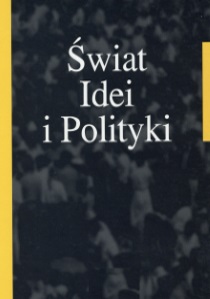Mother of God, Banish Putin. Feminists Against Authoritarianism in Russia
DOI:
https://doi.org/10.34767/SIIP.2019.18.17Keywords:
Russia, church, power, authoritarianism, Pussy RiotAbstract
The events that took place in Russia at the end of 2011 – the rigged parliamentary elections and the nomination of Vladimir Putin as presidential candidate, his return to the Kremlin after four years,caused numerous protests on a previously unknown scale. According to various estimates, tens of thousands of dissatisfied citizens took to the streets of Moscow. They were led by Alexei Navalny and Boris Nemtsov, who was later murdered in 2015. The public support of the authorities and the condemnation of the protesters by Patriarch Cyril – the head of the Russian Orthodox Church, was met with a reaction from a now outraged society. On February, 21 2012, the famous feminist group Pussy Riot, staged a performance in the building of the Council of Christ the Saviour in Moscow. The performance was to be a form of protest against the informal alliance of „the throne and the altar”. This informal alliance has been present in Russia for many years, it obliges both sides to mutual support, especially in times of crisis. The trial of the three members of the Pussy Riot group – Nadezhda Tolokonnikova, Ekaterina Samucevich
and Maria Alokhina was strictly political, despite strict efforts of judges and prosecutors to change its character. Under the pretence of offending religious feelings, a political lynch was carried out against the three women. The real reason for such harsh actions, was disobedience against the head of the Russian state and standing in opposition to the authoritarian form of government. The phoney trial was treated as a warning to the system’s opponents, for them to think twice before undertaking any actions against the state authorities. Pussy Riot’s performance and its consequences have provoked many questions about the condition of the rule of law in Russia and the durability of Vladimir Putin’s regime. The article describes the earlier activities of Pussy Riot, background of
the events preceding performance in the Cathedral of Christ the Savior, a trial and the world’s response to the verdict. The research area durability and stability of political system in Russia during the presidency of Vladimir Putin and what it guarantees. The main hypothesis is the assumption that any manifestation or insubordination to the existing order in Russia is treated as an affront, and every person undertaking such action must be severely punished and stigmatized. The research method used in the article is an analysis of written sources.
References
Aktywistki Pussy Riot wychodzą na wolność. (2013). Dziennik.pl. Pobrano z lokalizacji https://wiadomosci.dziennik.pl/swiat/artykuly/446438,jedna-z-czlonkin-pussy-riotwyszla-na-wolnosc.html.
Andrew, C., Mitrochin W. (2001). Archiwum Mitrochina. Warszawa: Wydawnictwo Literackie MUZA SA.
Bączek, A. (2016). „Tak zwany proces”, „tak zwany sąd”, „tak zwana wolność”, czyli co sprawa Pussy Riot mówi nam o współczesnej Rosji. W: R. Kordoński & Ł. Muszyński & O. Kordonska & D. Kamilewicz-Rucińska & J. Ruciński (red.), Transformacja środowiska międzynarodowego i jego wielowymiarowość. Tom I. Lwów-Olsztyn: Lwowski Uniwersytet Narodowy im. Iwana Franki.
Chawryło, K. (2015). Sojusz ołtarza z tronem: Rosyjski Kościół Prawosławny a władza w Rosji, Prace OSW, 54.
Członkinie Pussy Riot brutalnie zaatakowane w Soczi. Zbili je biczem, szarpali. (2014).Gazeta.pl Wiadomości. Pobrano z lokalizacji http://wiadomosci.gazeta.pl/wiadomosci/1,114871,15491057,Czlonkinie_Pussy_Riot_brutalnie_zaatakowane_w_Soczi_.html.
Gates, T. (Director). House of Cards [TV Series]. Chapter 29. USA: Netflix.
Gessen, M. (2014). Słowa skruszą mury. Pussy Riot. Warszawa: Prószyński i S-ka.
Kuczyński, G. (2012, 16 sierpnia). Sojusz tronu z ołtarzem. Cerkiew Patriarchy Cyryla.TVN24. Pobrano z lokalizacji https://www.tvn24.pl/wiadomosci-ze-swiata,2/sojusztronu-z-oltarzem-cerkiew-patriarchy-cyryla,271007.html.
Kurczab-Redlich, K. (2016). Wowa, Wołodia, Władimir. Tajemnice Rosji Putina. Warszawa: W.A.B.
Lee Myers, S. (2016). Nowy car. Wczesne lata i rządy Władimira Putina. Katowice: Wydawnictwo Sonia Draga.
Lerner, M., Pozdorovkin, M. (Director). (2013). Pussy Riot. A Punk’s Prayer [Motion picture]. Great Britain, Russia: Roast Beef Production.
Początek procesu Pussy Riot. Grozi im nawet 7 lat więzienia. (2012). Newsweek. Pobrano z lokalizacji https://www.newsweek.pl/swiat/rozpoczal-sie-proces-pussy-riot/z8byjqh.
Posłuszny, Ł. (2014). Kobiety walczące – kobiety grające. W: B. Walęciuk-Dejneka & J. Posłuszna (red.), Niepokorne – konstrukty kobiece w kulturze. Kraków: Aureus.
Pussy Riot skazane. Dwa lata łagru za „chuligaństwo”. (2012). TVN24. Pobrano z lokalizacji https://www.tvn24.pl/wiadomosci-ze-swiata,2/pussy-riot-skazanedwa-lata-lagru-za-chuliganstwo,271488.html.
Radziwinowicz, W. (2012, 22 sierpnia). Łagier dla Pussy Riot. Gazeta Wyborcza.
W Moskwie rusza proces Pussy Riot. (2012). PolskieRadio24.pl. Pobrano z lokalizacji https://www.polskieradio24.pl/5/3/Artykul/654351,W-Moskwie-rusza-proces-Pussy-Riot.
Woźniczko-Czeczott, J. (2014, 3 stycznia). Nadieżda Tołokonnikowa: Nigdy mnie do niczego nie zmuszaj. Wysokie Obcasy. Pobrano z lokalizacjihttp://www.wysokieobcasy.pl/wysokieobcasy/1,114757,15167366,Nadiezda_Tolokonnikowa__Nigdy_mnie_do_niczego_nie.html.
Zachód krytykuje wyrok w sprawie Pussy Riot. (2012). Newsweek. Pobrano z lokalizacji https://www.newsweek.pl/swiat/wyrok-w-sprawie-pussy-riot-krytykowany-przezzachod/c9rlnrj.
Zapadł wyrok ws. dziewczyn z Pussy Riot. (2012). Wiadomości WP. Pobrano z lokalizacji https://wiadomosci.wp.pl/zapadl-wyrok-ws-dziewczyn-z-pussy-riot-6031527292228225a.

